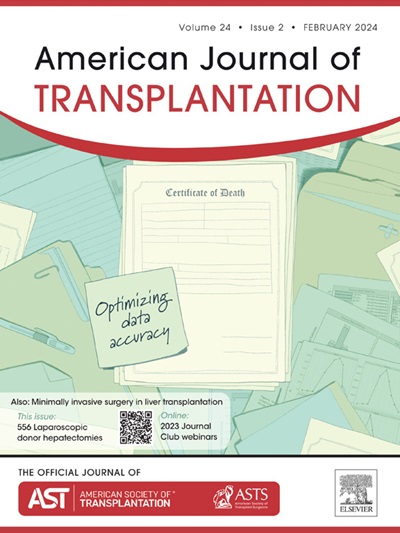细胞治疗用人il -10产生ILC2s增强胰岛功能和抑制同种异体移植排斥反应。
IF 8.2
2区 医学
Q1 SURGERY
引用次数: 0
摘要
产生IL-10 (IL-10+ILC2s)的2组先天淋巴细胞(ILC2s)在小鼠研究中已显示出调节和组织保护特性,但缺乏临床前研究来探索人类IL-10+ILC2s作为促进移植或自身免疫耐受的细胞疗法的潜力。在此,我们研究了人IL-10+ILC2s是否能增强胰岛功能,并在人源化小鼠胰岛移植模型中预防同种异体移植排斥反应。在体外,人IL-10+ILC2s对异体死亡供体胰岛或干细胞来源的胰岛样细胞没有细胞毒性,与IL-10+ILC2s共移植可显著改善移植后的血糖控制。同种异体IL10+ILC2s在体外直接抑制T细胞介导的对胰岛样细胞的细胞毒性,并且在抗原特异性移植排斥模型中,阻止T细胞介导的对死亡供体胰岛移植物的排斥。同种异体IL-10+ILC2s的效果更大,因为自体细胞在体外不抑制T细胞IFN-γ的产生或细胞毒性活性,并且不足以防止体内胰岛排斥反应。总的来说,这些研究提供了人类IL-10+ILC2s在胰岛移植和1型糖尿病中具有治疗潜力的原理证明,并支持它们作为异体调节细胞治疗的使用。本文章由计算机程序翻译,如有差异,请以英文原文为准。
Cell therapy with human interleukin 10–producing ILC2s enhances islet function and inhibits allograft rejection
Group 2 innate lymphoid cells (ILC2s) that produce interleukin (IL)-10 (IL-10+ILC2s) have demonstrated regulatory and tissue-protective properties in murine studies, but preclinical studies are lacking that explore the potential of human IL-10+ILC2s as a tolerance-promoting cell therapy for transplantation or autoimmunity. Here, we investigated whether human IL-10+ILC2s could enhance islet function and prevent allograft rejection in humanized mouse models of islet transplantation. In vitro, human IL-10+ILC2s did not display cytotoxicity toward allogeneic deceased-donor islets or stem cell–derived islet-like cells, and co-transplantation with IL-10+ILC2s significantly improved glucose control post-transplantation. Allogeneic IL10+ILC2s directly inhibited T cell–mediated cytotoxicity against islet-like cells in vitro and, in an antigen-specific transplant rejection model, prevented T cell–mediated rejection of deceased-donor islet grafts. Effects were greater with allogeneic IL-10+ILC2s, as autologous cells did not inhibit T cell interferon-γ production or cytotoxic activity in vitro and were not sufficient to prevent islet rejection in vivo. Collectively, these studies provide proof-of-principle that human IL-10+ILC2s have therapeutic potential for islet transplantation and type 1 diabetes and support their use as an allogeneic regulatory cell therapy.
求助全文
通过发布文献求助,成功后即可免费获取论文全文。
去求助
来源期刊
CiteScore
18.70
自引率
4.50%
发文量
346
审稿时长
26 days
期刊介绍:
The American Journal of Transplantation is a leading journal in the field of transplantation. It serves as a forum for debate and reassessment, an agent of change, and a major platform for promoting understanding, improving results, and advancing science. Published monthly, it provides an essential resource for researchers and clinicians worldwide.
The journal publishes original articles, case reports, invited reviews, letters to the editor, critical reviews, news features, consensus documents, and guidelines over 12 issues a year. It covers all major subject areas in transplantation, including thoracic (heart, lung), abdominal (kidney, liver, pancreas, islets), tissue and stem cell transplantation, organ and tissue donation and preservation, tissue injury, repair, inflammation, and aging, histocompatibility, drugs and pharmacology, graft survival, and prevention of graft dysfunction and failure. It also explores ethical and social issues in the field.

 求助内容:
求助内容: 应助结果提醒方式:
应助结果提醒方式:


